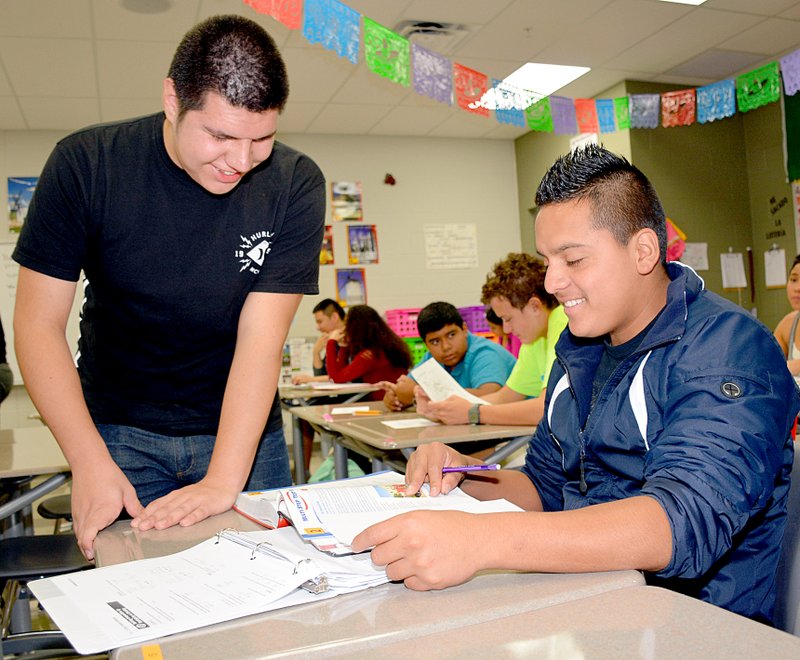A new student-led mentoring program is helping students who don't speak English make a smooth transition into Siloam Springs High School.
Starting in a new high school can be challenging for any teenager, but add a language barrier and simple tasks like finding the bathroom or figuring out schedules are even more intimidating -- not to mention keeping up with what's going on in class.
Seniors Carla Zamora, Brian Magaña and Oscar Guzman -- who all three speak English and Spanish -- were used to helping new students in the halls and the classroom. They decided to have an even greater impact by starting a mentoring program for high school students who speak English as a second language.
The new program is called ALAS, which means "wings" in Spanish. In English, the acronym stands for Assisting Latinos Achieve Success. In Spanish it stands for Ayudando Latinos Alcanzar Sueños, which translates to "helping Latinos reach their dreams."
Zamora, Magaña and Guzman were all three born in the United States, but they watched the difficulties their parents went through as they learned to speak English.
Every year there are a handful of new student's who don't speak English, but this year there are about 25 new non-English speakers in the high school, said teacher Melanie Maldonado.
Maldonado sponsors the mentoring program along with teachers Pam Reynolds and Loretta Radeke.
At least 18 students have stepped up to be mentors for the program. Every morning during encore period -- or study hall -- students gather in Maldonado's and Reynolds' classrooms. They pull out their homework and their mentors jump right in helping and answering questions.
Most commonly, the non-English speakers ask for help with math and Algebra, Maldonado said. Algebra can be a challenge for any student, but taking the class in a foreign language is even harder. Some students have had very little formal education, while others have fallen several years behind, she said.
ALAS is also organizing trips to the University of Arkansas for freshmen and sophomores to give them an idea what college looks like and to help them realize the possibilities.
Many non-English speaking students become frustrated with school, Magaña said. They may act out by becoming the class clown --or even give up and drop out.
Magaña hopes the mentoring program will help students realize their potential.
"A lot of them are smart and they don't even know it," he said.
ALAS began on the first day of school. The mentors jumped right in helping the new students figure out their class schedule and find their way around the building.
Two months into the school year, Zamora, Guzman and Magaña have seen a positive reaction from students.
'They're becoming more optimistic," Magaña said.
Zamora said the students she mentors are very comfortable with her and often approach her outside of school to ask questions. She sees them becoming much more comfortable at school because of the mentoring program.
Guzman has also found the students aren't shy about talking to their peers.
"Being fellow students helps us connect on a deeper level because we understand what they're going through," said Magaña.
The mentors also try to get English-as-a-second-language students involved in sports and school clubs. The more involved students become in school activities the more likely they are to stay in school and graduate, Maldanado said.
Maldanado, who is new to Siloam Springs, said she is impressed by the mentors' spirit of giving.
"The kids have been very inspiring to me as a new person in the community," she said.
Magaña said being involved with ALAS and watching what his peers are going through has made him more empathetic.
Guzman said he sees the mentors as playing the role of an older brother or sister. It's also nice that the younger students look at them as role models, he said.
"At the end of the day," Zamora said, "I feel like I've accomplished something."
General News on 10/01/2014
